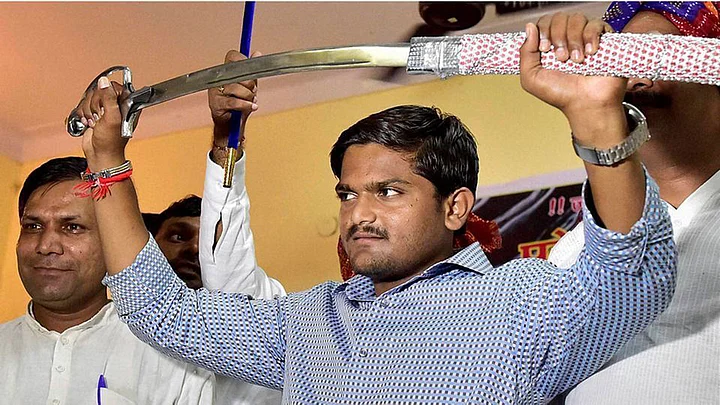While the powerful government gets more protection, vulnerable people remain apprehensive.
Hardik Patel, the self-proclaimed leader of the Patidar community, is not one to shy away from issuing rallying cries which could be construed as a call to arms, in the literal sense, or, as in the instant case, a clarion call to murder.
Always embracing belligerence over dialogue, and espousing “dabangai” (aggression) as the only way to bring about a radical societal transformation, he has, from time to time, brandished guns and swords at public rallies, and exhorted his followers to go on the rampage.
But his luck seemed to have run out on October 3, when accompanied by hundreds of supporters and the crew of a TV channel, he visited one Vipul Desai, who had vowed to self-immolate for the sake of the Patel cause.
Hardik Patel Gets Away With Hate Speech Despite Sedition Laws
As was recorded by the crew, and broadcast across all local channels in Gujarat, Hardik dissuaded Desai from endangering his own life, and instead called for the killing of “two to five policemen”.
The Gujarat government was quick to slap sedition charges on him, contending that his advice or proclamation, which was widely disseminated, not only threatened to throw the administration and maintenance of public order into a tizzy, but also amounted to a demand for insurrection against the “government established by law.”
On 27 October, the Gujarat High Court ruled in the government’s favour with regards to the sedition charge, but held that Patel did not indulge in hate speech, which could destabilise communal harmony.
This begs the question – did the court, while strengthening the sedition law, give Patel a free pass to indulge in hate-mongering?
Government and Its Agents – One and the Same
In court, Hardik initially denied having made any such incendiary proclamation, and instead contended that he had only whispered in Desai’s ear. The government produced CDs of the broadcast to rebut this claim. It is then that his lawyer argued that even if he had made that statement, sedition charges cannot be levied on him.
This contention wasn’t entirely without merit. Because, in 1962, a constitution bench of the Supreme Court in the Kedar Nath Singh case had held that it would be sedition only when a person incited hatred against the “government elected by law”; even trenchant criticism of officials engaged in the administration would not be an offence, because they are individuals.
So, by this token, one could demand the lynching of policemen, or call for wanton destruction of public property, and still get away.
Of course, in recent times, the sedition law has weathered a storm of criticism because of how it is used by all governments who are determined to muzzle any dissent or criticism. Civil liberties activists have spoken out strongly against it, harping upon the fact that this vestige of a colonial era had no place in a democratic polity.
Of late, sedition and its discontents have found prominent place in public discourse because of the Maharashtra government’s strident circular, which it was forced to withdraw because of mounting public pressure. Nonetheless, there did remain a niggling glitch in the interpretation of the law, and Patel seized upon it.
The court was quick to reject this claim, holding that the distinction between individuals- government servants, bureaucrats, the police force and the State, or “government established by law” was a tenuous one, and therefore untenable.
Justice Pardiwala, writing the judgement, stated that these agents of the state, who carry out its administration, cannot be regarded as separate entities. Because, at the end of the day, they carry out the tasks of a duly elected government, and hence, are a part and parcel of it.
Disregarding Police as a “Community” Won’t Wipe Patel’s Slate Clean of Hate Speech
Under Law, Police Force not a “Community,” but What About Others?
Besides sedition, Hardik had also been booked under Sections 153A and 505(2) of the IPC, which taken together, criminalises the making and circulation of any speech or statement that could fuel enmity between different communities on grounds of race or religion.
In all his public speeches, Patel has had no qualms in using hurtful rhetoric to press forward his community’s demands. He, while disparaging other communities from milking the reservation system, has consistently maintained that either the Patels should be granted OBC (Other Backward Classes) status, or the reservations system should be junked altogether. He has stoutly resisted walking on any middle path.
Some commentators such as Zahir Janmohamed, Shikha Trivedy and Ajaz Ashraf have expressed apprehension over his demands, wondering if they were not opportunistic, and fearing that his agitation could again throw Gujarat into a cauldron of caste and communal polarisation.
Patel’s resolute insistence upon violent agitation has done nothing to assuage these concerns.
It is here that the court could have intervened and put a halt to Patel’s incessant barrage of antagonising statements. But it didn’t. It went by a constricted meaning of “community”, and held that since his statement was made only against policemen, it would not attract the provisions against hate speech, because cops by themselves would not constitute a “community” as provided for under the law.
Thus, while fortifying the sedition law, which allows the mighty State to penalize dissidents, the court ended up, even if unwittingly, giving ample leeway to hate speech.
(At The Quint, we question everything. Play an active role in shaping our journalism by becoming a member today.)
